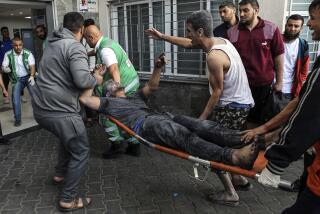Afghanistan isn’t Vietnam -- yet
- Share via
Has Afghanistan turned into Barack Obama’s Vietnam?
It could, but it hasn’t yet. At this point, there are still crucial differences between the two wars, including:
* Support at home. The American public’s support for the war has certainly declined, but eight years after 9/11, enthusiasm for its original goal of destroying Al Qaeda remains strong.
* A smaller, more targeted fighting force. More than 500,000 U.S. troops were in Vietnam in 1969; more than 58,000 died in the course of the war. U.S. troop strength in Afghanistan will reach 68,000 later this year; as of last week, 562 had been killed in action -- about one-hundredth the toll of the Vietnam War.
* Honest military assessments. In Vietnam, U.S. commanders sugarcoated their analysis for the folks back home. In Afghanistan, the chairman of the Joint Chiefs of Staff, Adm. Michael G. Mullen, recently called the situation “serious and deteriorating.” And Mullen, who began his career as a Navy officer in Vietnam, makes a point of promising no quick victory. “By no means do I think we can turn [Afghanistan] around in 12 to 18 months, but I think we can start,” he told me last week.
The war has been long, costly and unsuccessful, but Obama and his generals still have a chance to turn it around.
Still, on at least one important count, Afghanistan does resemble Vietnam: Its central government is both incompetent and deeply corrupt, and that could sink the war effort.
“If the government of Afghanistan now goes into free fall, something like the South Vietnamese governments of the 1960s, then all the troops in the world really aren’t going to matter,” warned Bruce Riedel, who directed the administration’s review of policy on Afghanistan and neighboring Pakistan.
How bad is it? Transparency International, an independent group that measures corruption around the world, ranks Afghanistan as one of the world’s five worst governments, 176th out of 180. Afghans report that police officers, judges and other officials routinely shake them down for bribes.
Meanwhile, the Taliban, which came to power in 1996 because it promised to be incorruptible, has reportedly appointed ombudsmen -- ombudsmen! -- in the growing areas it controls.
Last month’s presidential election in Afghanistan was intended to bolster the legitimacy of whatever government emerged. It didn’t. Supporters of President Hamid Karzai corrupted the election on a grand scale, stealing ballots, preventing opponents from voting and stuffing ballot boxes. Instead of strengthening the government’s legitimacy, the election weakened it.
That’s why this month’s noisy debate about how many more troops Obama will send to Afghanistan is almost a sideshow. Mullen said he’s confident that his commander in Kabul, Army Gen. Stanley A. McChrystal, can improve security on the ground with an Afghan version of the counterinsurgency strategy that worked in Iraq. “We know how to do this,” Mullen said at a news conference Thursday.
The more difficult question is whether the Afghan government can take advantage of whatever security the Americans give it. That’s why the most important number to watch may not be Obama’s troop increase but the “civilian surge” of advisors, aid workers, agricultural experts and anti-corruption investigators who are also moving into the country. That number is much smaller, and its impact is far less certain.
Richard C. Holbrooke, the diplomatic heavyweight who’s running the civilian effort, calls the approach “smart power.” Holbrooke is trying to increase the number of U.S. civilian officials in Afghanistan from about 450 to about 900 by the end of the year, and says the program is on track.
But that’s unlikely to be nearly enough. With Karzai’s central government discredited, the U.S. needs to bypass Kabul and instead funnel money and other assistance to local governments in Afghanistan’s 34 provinces and 399 districts. And that could take a lot more than 900 people.
“We need to stop talking about ‘smart power’ as if we had it,” said Anthony H. Cordesman, a civilian scholar who has advised McChrystal. “We don’t have the civilians in the field. The so-called civilian surge will not come close to the minimal requirements.”
When McChrystal, Mullen and Defense Secretary Robert M. Gates give Obama their formal request for more troops this month, the goals they offer will be modest. The war in Afghanistan can’t be “won” in 18 months, they will say, but at least we can find out in that time whether it’s winnable.
“This situation has deteriorated so far that there are really only two questions,” Riedel said. “Can it be stabilized with any amount of resources? Or is it just too little too late? We’re not going to know the answer to those questions in any serious way for at least 12 to 18 months.”
The one option that won’t work, Obama’s advisors argue , is withdrawal. “There’s no way to defeat Al Qaeda, which is the mission, with just that approach,” Mullen said. “You can’t do it remotely.”
To learn whether the war is even winnable, and to avoid seeing it turn into another Vietnam, Obama needs to do two things. He needs to rally public and congressional support behind another troop increase; that, oddly enough, will be the easy part. And he needs to find ways to make Afghanistan’s government work, by ramping up the civilian surge and getting aid directly to local leaders who deliver services to their constituents -- even if, in some cases, they aren’t as clean as we’d like. That will be the hard part.
A year or more from now, we will still be debating whether Afghanistan is turning into Obama’s Vietnam. If the president is lucky, the question will still be open.
--
More to Read
Sign up for Essential California
The most important California stories and recommendations in your inbox every morning.
You may occasionally receive promotional content from the Los Angeles Times.













